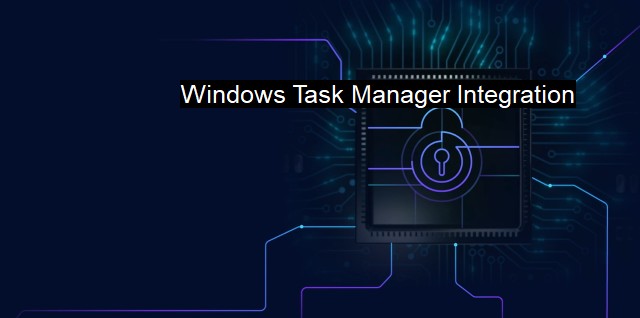What is Windows Task Manager Integration?
Strengthening Cybersecurity: How Windows Task Manager Integration Enhances Antivirus Protection and Process Management
"Windows Task Manager Integration" refers to the seamless integration of an application or software like an Antivirus or cybersecurity system with the Windows Task Manager. The Windows Task Manager is a system utility provided by Microsoft Windows that provides information about the processes and programs running on a computer, as well as the general status of the system. This integration has important implications for cybersecurity, as it can provide crucial information about potential malicious activities and system vulnerabilities, hence allowing antiviruses to act effectively to mitigate risks.Task Manager Integration allows antiviruses to use the resources that are available in the Task Manager to assess, monitor, and control the processes that are currently running on a system. This is crucial for detecting potentially harmful or unknown processes that may not initially appear suspicious. For an antivirus or cybersecurity software, detecting unknown or potentially harmful activities is critical for preventing data breaches and other cyber attacks.
One of the ways in which an antivirus may use task manager integration to enhance security is by automatically scanning the active processes on the list provided by the Windows Task Manager and comparing these processes with a database of known threats. It will allow the antivirus to not only detect an in-progress attack but also to deploy preventative measures promptly, thereby minimizing the potential damage and securing the system against future attacks.
Task Manager Integration is further beneficial as it provides real-time monitoring of system processes. This ensures that any malicious activity is promptly identified and dealt with. Consequently, the potential for an evolving threat to cause harm to a system before detection and response are markedly reduced. This continuous scanning and analysis of processes help in eradication of threats that change their behavior dynamically, known as polymorphic threats.
Also, Task Manager Integration provides a way for the antivirus to monitor the system’s CPU usage. Unusually high levels of CPU usage may be a sign of a malware attack, as malicious software often takes up system resources to execute harmful tasks. A comprehensive antivirus will have thresholds set up to trigger alerts whenever CPU usage exceeds normal levels, thereby enabling early detection of an ongoing attack.
It bears noting that utilizing the functionality of the Task Manager allows for faster response times in cybersecurity measures since it negates the need for a standalone process monitoring mechanism. Leveraging Windows Task Manager, antivirus engines have immediate access to the process information and resources usage. this also decreases the compute and memory footprint of the antivirus solution itself as repeated functionality is not developed, enhancing overall system performance.
The functionality of the Task Manager can be leveraged by integrating with its suspend-resume feature for potential threats. Instead of abruptly stopping a potentially harmful but critical system process and causing system instability, it can be suspended, analyzed, and then correctly rectified. Thus, Task Manager Integration could potentially augment stability and security simultaneously.
"Windows Task Manager Integration" significantly enhances the effectiveness of antivirus applications in maintaining cybersecurity. By offering thorough monitoring of system processes with the ability to detect unusual or suspicious activity, providing real-time alerts about potential dangers, and allowing for a quick response to any potential threats, Task Manager Integration can be a crucial aspect of countering cyber threats and reinforcing the security of a digital ecosystem, thereby providing a safer cyber environment for the user.

Windows Task Manager Integration FAQs
What is Windows Task Manager Integration in cybersecurity and antivirus?
Windows Task Manager Integration is a security feature that allows antivirus programs to access and monitor running processes, services, and applications in the Windows Task Manager. The integration helps antivirus software to detect and prevent malicious programs from running in the background without the user's knowledge.How does Windows Task Manager Integration work?
Windows Task Manager Integration works by adding a new tab in the Windows Task Manager, which displays the list of running processes and services. Antivirus programs use this feature to monitor the behavior of all processes and applications, and identify any suspicious or malicious activity. If any such activity is detected, the antivirus program can terminate the process or quarantine the file to prevent further damage to the system.What are the benefits of Windows Task Manager Integration?
Windows Task Manager Integration provides several benefits to cybersecurity and antivirus programs, including real-time monitoring of running processes, efficient detection of malware and viruses, and easy termination of risky or suspicious activities. With this feature, antivirus programs can provide better protection against cyber threats and prevent them from causing harm to the system.Is Windows Task Manager Integration enabled by default in Windows operating systems?
Yes, Windows Task Manager Integration is enabled by default in Windows operating systems. Antivirus programs can easily access and utilize this feature to provide better protection against cyber threats. However, users can disable or restrict access to the Windows Task Manager for security reasons, and prevent unauthorized access to sensitive system information.| | A | | | B | | | C | | | D | | | E | | | F | | | G | | | H | | | I | | | J | | | K | | | L | | | M | |
| | N | | | O | | | P | | | Q | | | R | | | S | | | T | | | U | | | V | | | W | | | X | | | Y | | | Z | |
| | 1 | | | 2 | | | 3 | | | 4 | | | 7 | | | 8 | | |||||||